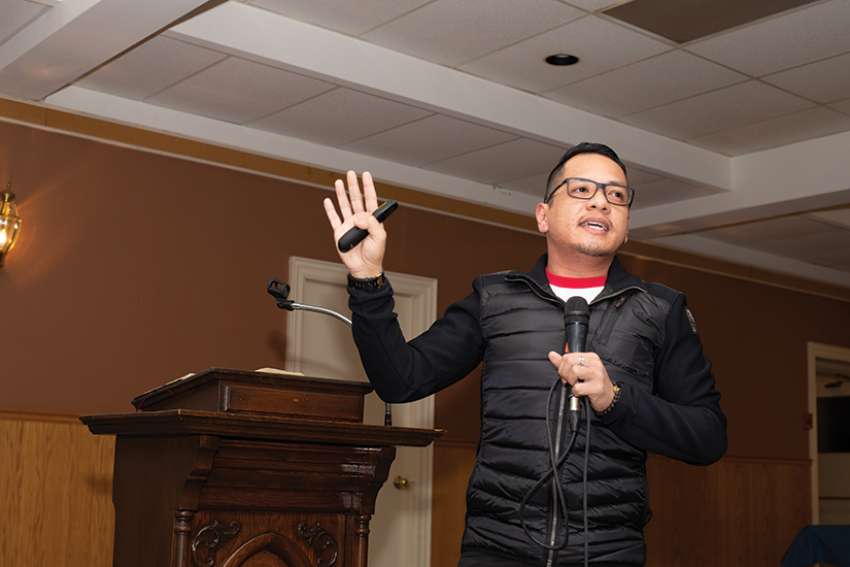“Her co-worker was just very ferocious, in terms of, ‘I can’t believe you would take that stance,’ ” he said, recalling the story. “She was kind of caught off guard and thought, ‘Where is this hostility coming from?’ ”
This is a common occurrence for practising Catholics today, said Mamaradlo, which is why a new wave of apologetics is in demand among young adults in the Church.
“There’s a genuine hunger there to take the faith seriously,” he said. “They know it comes up at work, at home, and it comes up in their relationships. And the problem is the majority of Catholic people don’t know how to answer it so they themselves aren’t convinced.”
Mamaradlo led an introduction to Catholic apologetics last month hosted by St. Christopher’s Parish in Mississauga, Ont., and organized by leaders of Spiritus Vitae, a part of the young adults ministry of the Office of Catholic Youth in the Toronto archdiocese.
Mamaradlo said there is a lot of hostility about certain teachings of the Church, particularly on abortion and euthanasia, and the clerical sex abuse crisis. As Catholics, he said, before we can have an open and honest conversation we must first have the ability to empathize with the other person.
“The process of apologetics involves a lot of listening,” said Mamaradlo. To illustrate, he cited the example of the pro-life woman and the co-worker.
“The conversation progressed and the co-worker mentioned that her mom had an abortion and it clicked in her head that this wasn’t an abstract issue, so my comment was being taken as a personal attack.”
Mamaradlo is a lay pastoral associate at St. Joseph the Worker Parish in Thornhill, Ont. He has a Master’s degree in Divinity and a Baccalaureate in Sacred Theology from University of Toronto.
He said that in the history of apologetics, the goal is not to convert someone on the spot because that rarely works in the defender’s favour. Instead, the goal is to “make a defence to anyone who calls you to account for the hope that is in you, yet do it with gentleness and reverenc.” (1 Peter 3:15).
“If someone hears the word Catholic, if someone hears the word Christian, and all they hear is it’s anti-gay, it’s anti-woman, it’s anti-sex, it’s anti-science... then we have failed.” said Mamaradlo. “The Gospel, at its core, is Good News. The reason why the Church says ‘no’ to certain things is so that we are free to say ‘yes’ to something greater.”
Apologetics cannot be a one-time deal, said Mamaradlo. A conversation about apologetics must come in three stages: know the person, know the path and know the purpose.
Underneath the argument, there is a genuine curiosity about what the Catholic Church teaches about a controversial topic. Once identified, it is easier to have an authentic and compassionate exchange.
“If we can’t achieve that balance of I disagree with you and you disagree with me, I will cut you off. That’s the culture that we are in,” he said. “Part of having a genuine culture of inter-religion and multi-culture is the ability to be able to disagree, but we should still be able to talk about it and go out for a beer afterwards.”
Diane Pacom, sociologist and retired professor from University of Ottawa, said that the digital age has changed the way in which young people are formed in their faith.
Pacom said that on average, people gain their “digital citizenship” at 14 years old and some begin accessing the Internet as young as six or seven years old.
With access to so many points of view from around the world, society is no longer as homogenous as it once was and Pacom said this leads to a fragmented sense of reality.
“I was born and raised in a good Christian home and who was giving me information about my religion? My mom, the Church and my school, and it was totally coherent,” said Pacom. “Now it isn’t the case. So this lack of coherence has to be part and parcel of our understanding of how young people relate to faith, especially Catholics.”
Support The Catholic Register
Unlike many other news websites, The Catholic Register has never charged readers for access to the news and information on our site. We want to keep our award-winning journalism as widely available as possible. But we need your help.
For more than 125 years, The Register has been a trusted source of faith based journalism. By making even a small donation you help ensure our future as an important voice in the Catholic Church. If you support the mission of Catholic journalism, please donate today. Thank you.

